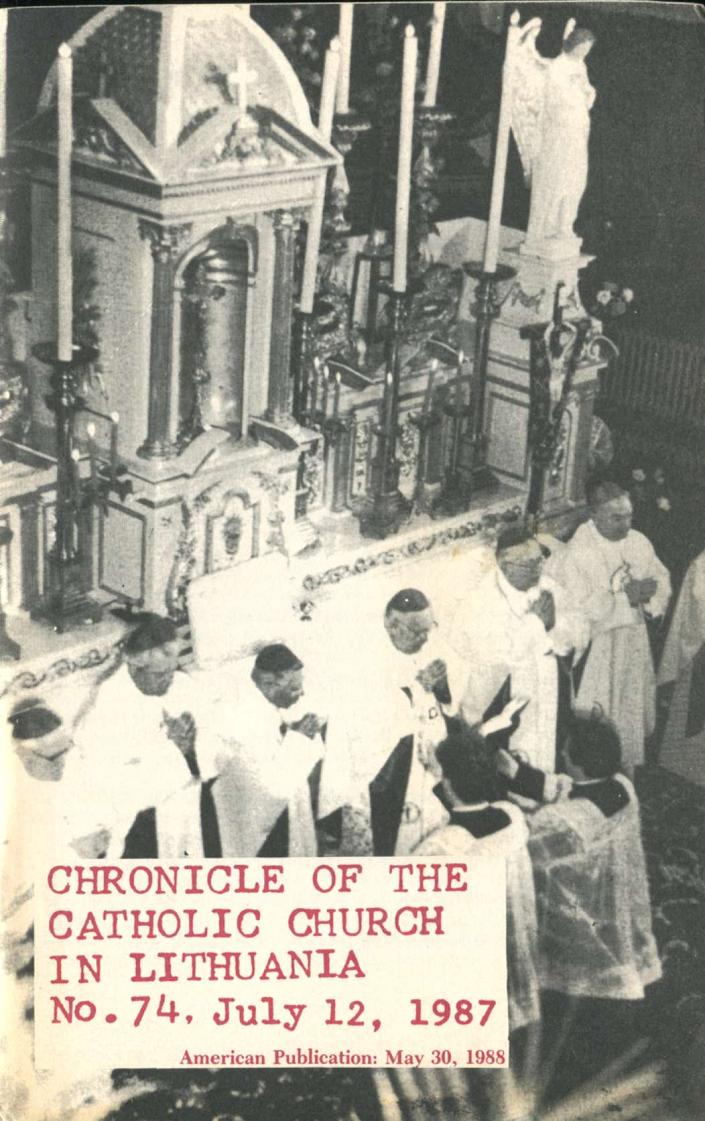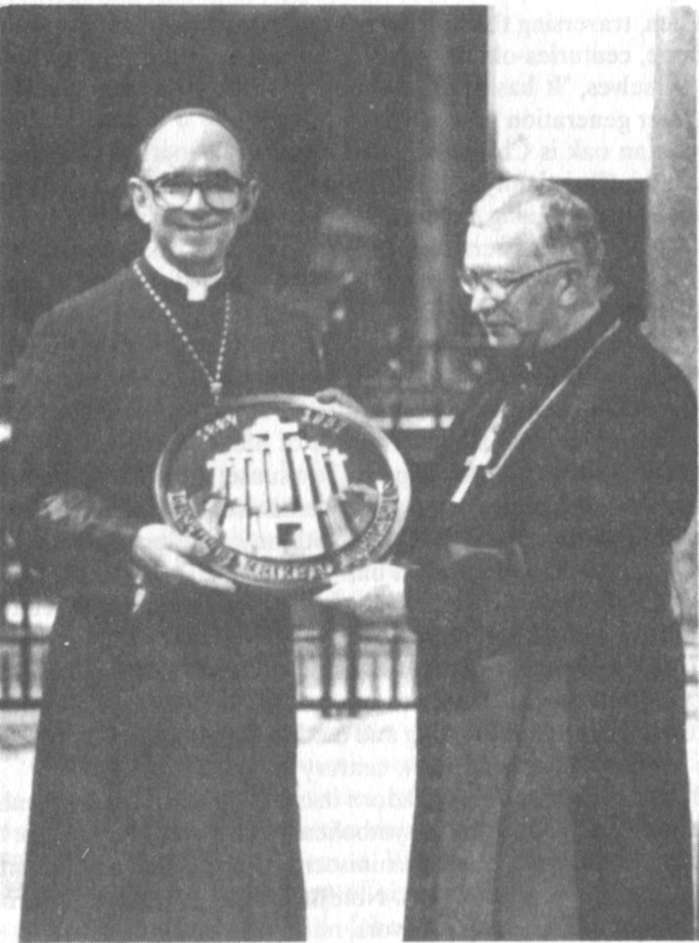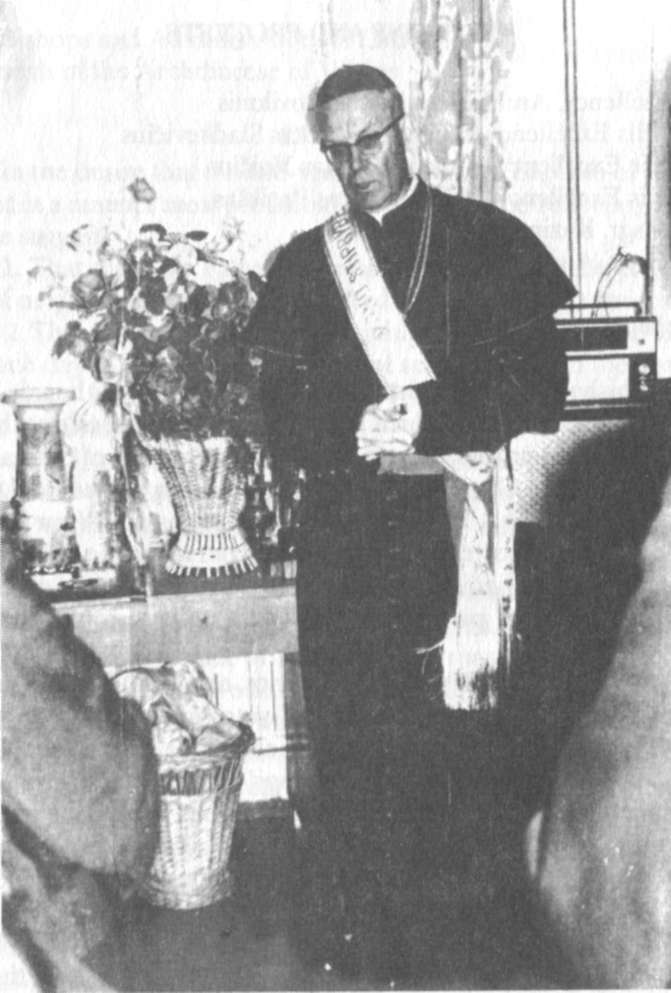
Appearing since 1972
Read this and pass it on!
THE CHRONICLE OF THE CATHOLIC CHURCH IN LITHUANIA, No. 74 
In this issue:
3.The Jubilee and Uninvited Helpers
Lithuania July 12,1987
Holy Father, we thank you for the love which you have shown our ancestral land and its Church, during the celebration of the 600th anniversary of the Baptism of Lithuania.
Your prayer, attention and love for Lithuania will provide support for us, continuing a tradition of six hundred years of fidelity to the Apostolic Sec. We pledge that, following the example of our forefathers, we will do everything possible so that the tics of atheism might not tear our ancestral land away from the rock of Saint Peter, just as in the past neither Protestantism nor Orthodoxy were able to tear it away. We will always accompany Your Holiness with prayer and love along the difficult way of your sacred duties.

Joseph Cardinal Bernardin (left) of Chicago accepting a gift in the name of the Catholics of Lithuania from Bishop Antanas Vaičius of Telšiai, Lithuania. The presentation took place in Rome at the Basilica of St. Mary Major, following a Mass of thanksgiving for the beatification of Archbishop Jurgis Matulaitis . Bishop Vaičius headed a delegation of eight priests sent to Rome from Lithuania, representing the six dioceses of Lithuania, the seminary and the Marian Fathers, to participate in the ceremonies commemorating the 600th anniversary of Lithuania's baptism in June, 1987.
When, traversing the hills and dales of our native land, we see by the wayside a large, centuries-old oak with its spreading branches, we immediately think to ourselves, "It has been standing, rustling, for so many years, while generation after generation passes by."
Such an oak is Christianity which has sunk roots six-hundred years deep in our land. Christianity is Christ come to our land, to our homes, to our hearts. It is Christ bringing light to our minds, parting the curtain which separated us from the answers to the most important questions of our lives, which move everyone without exception: Where did the world come from? Where did I come from? What awaits me after death? What kind of person should I be?
One after another across the country, celebrations of the 600th anniversary of the Baptism of Lithuania are taking place. This will continue throughout the jubilee year. In various parishes, they will be celebrated in different ways, depending on how much heart and effort parish leaders and the faithful themselves put into them. The main celebration of the jubilee took place June 28 at the principal Mass in the Church of SS. Peter and Paul in Vilnius. At the same time, celebrations took place in five churches in Vilnius. Presiding at solemn services in the Church of SS. Peter and Paul was His Excellency, Bishop Liudas Povilonis; in the Church of St. Theresa, Bishop Romualdas Krikščiūnas and the Administrator of the Archdiocese of Vilnius, Msgr. Algirdas Gutauskas; in the Church of St. Nicholas, Bishop Julijonas Steponavičius and the Administrator of the Diocese of Panevėžys, Msgr. Kazimieras Dulksnys; in the Church of the Immaculate Conception, Bishop Juozas Preikšas. In two churches of Vilnius, solemn jubilee services were held in Polish: Holy Spirit where Bishop Vladas Michelevičius presided and and St. Raphael where Bishop Vincentas Sladkevičius was the celebrant.
Participating in the jubilee celebration were guests: the Bishop of Riga and representatives of the Orthodox and Protestant churches. Participating in the services from the government were Commissioners for Religious Affairs Konstantin Kharchcv from the U.S.S.R. and Petras Anilionis from Lithuania.

Bishop Julijonas Steponavičius during his 75th birthday celebration in 1986. A priest for more than 51 years, Bishop Steponavičius has never been allowed to administer his See, the Archdiocese of Vilnius. Exiled without a trial for 27 years to the border town of Žagari, Lithuania, Bishop Steponavičius was permitted to visit the City of Vilnius only once, in 1980, to mark the occasion of his 25th anniversary as a bishop. Often rumored to be the Cardinal "in pec-tore " named by Pope John Paul II, Bishop Steponavičius has captured the concern of the West. In July, 1987, more than 100 members of the U.S. House of Representatives petitioned the U.S.S.R.'s Council for Religious Affairs Chairman Konstantui Kharchev to end the exile and allow Bishop Steponavičius to assume his duties as Apostolic Administrator of Vilnius.
To: His Excellency, Archbishop Liudas Povilonis Copies to: His Excellency, Bishop Vincentas Sladkevičius
His Excellency, Bishop Antanas Vaičius
His Excellency, Bishop Juozas Preikšas
Msgr. Kazimieras Dulksnys
Msgr. Algirdas Gutauskas
Your Excellency,
The bishops and administrators of the Church of Lithuania have sent me their letter of March 11 in which they propose that I preside at the solemn services commemorating the 600-year jubilee of the Baptism of Lithuania which are to take place in the Church of SS. Peter and Paul in Vilnius, and to preach the principal sermon. That letter of Your Excellencies and Your Reverences provides me with the opportunity of commenting on the jubilee celebration. The principal services of the jubilee should be the fruit of the labor of three years preparatory work on the part of the Bishops' Conference and the Baptism Jubilee Committee.
Vilkaviškis
On March 6,1987, a group of KGB, without giving their names, carried out a search at the home of Ona and Jurgis Brilius at No. 30 Vilniaus, in the City of Vilkaviškis. During the search the chekists took three issues of the underground publication Tiesos kelias (The Way of Truth), ten reams of typing paper, carbon paper, etc. The search lasted five hours.
In the course of the search, Father Antanas Liubšys, pastor of the parish of Bartininkai in the Rayon of Vilkaviškis was detained. When he firmly declared that he had to return to his parish in time for evening services, the priest was released after some delay.
After the search, the security agents took Brilius to Vilkaviškis KGB Headquarters for questioning. The chekists expressed annoyance and repeatedly accused Brilius of rearing his children poorly - two sons are priests. They also warned him that his daughter, Birutė Briliūtė, had allegedly been caught writing the Chronicle, and had been arrested.
Brilius stated that he had raised his children in the same way in which he himself lives. He refused to sign the report.
Irina Ratushinskaya (Tried for Religious Poetry)
My despised Country, What is more shameful than your nights... When did you lack unnatural children, Executioners and slaves even more!
How you trampled those trusting you,
How you murdered in blind zeal
Those who knew not how to betray themselves or others,
Those condemned to love You...
No, I do not blame the terrorized — Silent, your flocks of nightingales Why are your trampeled teardrops Crystallizing on the crosses?
Kaunas
On April 29,1987, the priests of the Rayon were summoned to meet with representatives of the government at the Offices of the Kaunas Rayon Executive Committee. Various officials told the priests about the achievements at the Rayon. Among them was mentioned the fact that with the restriction of liquor sales, the rayon is experiencing a deficit of two million. After the officials' statements, the pastor of Babtai, Father Ricardas Mikutevičius, asked why priests still do not have equal rights with the atheists. The lecturers tried to deny it, saying that one of the priests was even invited to the presidium of the meeting. Father Mikutevičius showed that priests are not accepted into the Society for the Preservation of Monuments and that among the priests there are those who are not bad writers, but not one of them is in the Writers' Union.
The postor of Tabariškiai, Father Petras Dumbliauskas, i,-oughi up the idea that priests are not even accepted in temperence societies, and here, by their work, they could really do a good job for the benefit of all. During the meeting, priests working in the Rayon of Kaunas protested against government sanctioned killing of unborn children, of whom every year in Lithuania, many more are killed than the number of men who used to die annually during the war.





